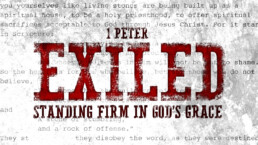Seeing & Savoring
From John Piper's The Pleasures of God:
Living for the glory of God “begs for lingering. The modern fast paced world will tempt you to rush and skim. This kind of life will make you shallow. The world does not need more widely read, shallow people. It needs deep people. I don’t mean complex. I don’t mean highly educated. I don’t mean you know big words. I don’t mean you know historical background. I mean you have seen glory-the glory of God in his Word. You have pondered it and felt its relation to all the parts of your life. You have been steadied and satisfied by it. You have come home. You are not frantic anymore. You are at peace in the presence of God.
Why Do We Have Hope?
1 Peter 3:15 says, “In your hearts honor Christ the Lord as holy, always being prepared to make a defense to anyone who asks you for a reason for the hope that is in you.”
This is not primarily a call to be verse in apologetics, though apologetics can be useful. Peter’s words are focusing on the hope we have. And primarily what’s the hope?
Peter answers that question in verse 18: “For Christ also suffered once for sins, the righteous for the unrighteous, that he might bring us to God, being put to death in the flesh but made alive in the spirit.”
That verse alone gives at least 5 specific reasons we have hope:
Why do we have hope? Because Christ suffered once for sins. He was sinless, so his sacrifice was perfect; it does not need to be repeated – it was once for all. Christ suffered for sin finally and fully for all those who trust in him.
Why do we have hope? Because Christ suffered, the righteous one for the unrighteous ones.
Why do we have hope? Because Christ suffered to bring us to God! The uniqueness of his death points to the ultimate purpose of his sacrifice – “to bring you to God.” Oh, what great hope this provides. The one in whose presence is the fullness of joy; the one who satisfies the longing soul and fills the hungry soul with good things. This is the One Christ brings us to.
Why do we have hope? Because Christ suffered being put to death in the flesh, but made alive in the Spirit; he rose again on the 3rd day. We have a living hope, because we serve a living Savior.
Why do we have hope? Because Christ not only rose again, but ascended to the heavens and is seated at the right hand of God with all authority over all things (v. 22).
Meditate on these truths so you can speak with gospel hope. And when you do, speak “with gentleness and respect.”
What Does 1 Peter 3:19-21 Mean?
(Note: A PDF version of this post is available here)
1 Peter 3:19-21 has confused many. Not the least of which was Martin Luther, who said: “A wonderful text is this, and a more obscure passage perhaps than any other in the New Testament, so that I do not know for certainty what Peter means.”
The main point is clarified by and culminates in verse 22: “[Jesus] has gone into heaven and is at the right hand of God, with angels, authorities, and powers having been subjected to him.”
So while the precise details may be confusing, the primary declaration of this text is not; it clearly states Jesus, the one who suffered as our all-sufficient Savior is now resurrected and exalted as the all-supreme Lord.
Those who trust in Christ have no need to fear that suffering will have the last word. We are like Noah – we are small minority in a hostile world, but we can be bold in our witness and confident that our future is secure.
What about the reference to baptism? Well, the water of baptism is like the waters of judgment, the flood waters, in Noah’s day – as we are immersed into the water we are reminded that we deserve death for our sins, just like those who died in the flood; and coming up from the water reminds we are kept safe by the ark of Christ and have risen to walk in newness of life.
Peter is reminding us that in our suffering Jesus still rules and reigns; by his death and resurrection Jesus has triumphed over sin, Satan, and death. And we too will be raised to new life in Christ Jesus. And because of that we have reason to hope.
But what about those nagging questions and “confusing” ideas presented in this passage? Essentially, there are four main questions:
- When did Christ go preach?
- What did he preach?
- Who are the spirits in prison?
- Where is this prison?
In an attempt to answer these questions coherently and cohesively, over the centuries several views have been most commonly held:
View 1: When Noah was building the ark, Christ ‘in the spirit’ preached through Noah to the unbelievers who were on earth during the time; they disobeyed and did not repent so now are ‘spirits in prison’ (i.e. persons in hell).
View 2: After Christ died, he descended to preach to fallen people in hell[1], proclaiming to them that he had triumphed over them and their condemnation was final.
View 3: After Christ died, he descended to preach to fallen evil angels in hell, proclaiming to them that he had triumphed over them and their condemnation was final.
View 4: After Christ rose from the dead, he ascended into heaven, to preach to fallen angels, to proclaim to them that he had triumphed over them and their condemnation was final.
Another (Heretical) View: After Christ died, he descended into a place (hell or purgatory depending on who you are talking to) to preach to people and offer a second chance of salvation. Those who hold this view typically extract it to mean that every person who dies gets a second chance at salvation. However, Scripture is emphatically clear that man dies once and after that faces judgment (cf. Lk. 16:19-31; Hb. 9:27).
Of the non-heretical views listed above, none of them are without lingering questions or exegetical issues. For example, while view 1 seems to bring everything together, it does not adequately explain why the Scripture says Jesus “went” for Christ does not really go anywhere if he preaches “in the Spirit” through Noah. Additionally, with the exception of one instance (Hb. 12:23) the plural form of “spirits” (Gk. pneumasin) always refers to angels not humans.
But it would seem strange to talk about God patiently waiting on angels as if they can be redeemed. The patience of God, as it is today, was directed to the sinners of Noah’s generation, those to whom Noah preached righteousness (cf. 2 Peter 2:5; 3:9). So which is it – does “sprits in prison” refer to humans or angels?
While views 2 & 3 have had some historical support, in my opinion, they seem to lack clear exegetical support. First, the word “prison” at no other place in Scripture refers to a place where humans go to be punished after death. Additionally, I would argue that a ‘disembodied descent’ into hell is ruled out by the phrase “he was made alive in the spirit.” Peter is not saying that Christ’s body died but his spirit continued to live in a disembodied state.
Some say that Peter is not necessarily referencing the timing of Christ’s physical resurrection, but to the power behind the resurrection. He’s contrasting “put to death in the flesh” – the physical, visible, transitory realm that belongs only to this present world – with “made alive in the spirit” – the eternal, spiritual realm of the Holy Spirit’s activity. So the they posit the text is saying Christ was “made alive by the power of the Holy Spirit.” If this were the case, then view 1 would clearly be a possibility (as it asserts Christ preached “in the Holy Spirit” or “by the power of the Holy Spirit” through Noah).
Other’s say this text necessarily refers to the timing of Christ’s physical resurrection; and what Peter is talking about is a post-resurrection. They say the participle “went” in verse 19 most naturally refers to the exaltation of Jesus; which, in context, fits well with verse 22 where Jesus is seated at the right hand of God. In fact, the word “went” in verse 19 has the same root of “has gone” in verse 22, which explicitly refers to the ascension of Jesus. This same word is also used in John 14:2, 3, 28; 16:7, 28 and Acts 1:11 to refer to Jesus’ ascension.
So with all that said, and much more could be said, if I had to ‘put my money on one’ it would be view 4. Let me be clear - it’s certainly not without its own remaining questions, and by no means am I saying it’s the only possible view; rather I hold this position humbly and tentatively. Here are the facts that push me this way:
- The word “spirits” almost always refers to angels;
- The New Testament repeatedly refers to angels in prison/chains (2 Pt. 2:4; Jude 6; Rev. 20:7);
- These fallen angels are said to be in heaven (cf. Rev. 12:7; 20:7);
- The weight of the passage seems to lean toward a post resurrection event.
So that’s where I land…how about you?
And What About the ‘Random’ Reference to Baptism?
First, let me say this passage does not teach that act of baptism itself saves you. Peter is very clear baptism saves you not as a mere outward physical act – “not as a removal of dirt from the body” the text says – but as an inward spiritual act – “appealing to God for a good conscience, through the resurrection of Jesus Christ.” Baptism is our public appeal to God to cleanse our guilty conscience, forgive our sins and give us new life in the resurrected Christ.
Peter is comparing the waters of judgment in Noah’s day with the waters of judgment in baptism. As we are immersed into the water we are reminded that we deserve death for our sins, just like those who died in the flood; and coming up from the water reminds we are kept safe by the ark of Christ and have risen to walk in newness of life.
For those that want more information, let me suggest these resources:
The ESV Study Bible – The notes on this passage are clear, succinct, and helpful.
The Message of 1 Peter by Edmund Clowney – Thorough and helpful, Clowney walks through each question asked above and provides balanced input for each view. He ultimately lands on view 1.
1 Peter by Howard Marshall – Similar to Clowney, Marshall systematically and pastorally walks through the main questions posed. He provides the benefits and drawbacks of each position and seems to land with view 4.
1 Peter by Wayne Grudem – Grudem provides the most expansive treatment on this text that I read. In fact, he devotes an entire appendix to the issues at hand. Whereas Clowney tends to land on view 1 by way of elimination, Grudem almost aggressively argues that view 1 is absolutely correct.
1, 2 Peter, Jude by Thomas Schriener – I think Schriener does the best job of providing a high level summary of this passage, which at the same time digging into the details. Like the other scholars a lot of his final conclusions rest of exegetical work and the precise use of Greek words. He argues that view 4 makes the best sense of these verses.
[1] For views 2 & 3, some commentators prefer to use the term “hades," which is a more general term for “the place of the dead.”
Worship Through Prayer
Graciously heavenly Father, we come to you boldly and confidently knowing that because there’s an empty tomb on earth, Jesus occupies the throne in heaven. We come to you as your sons and daughters, united to your eternal Son, Jesus Christ, through the power and fellowship of the Holy Spirit as he births faith and repentance in our hearts.
We come praising your name for the sake of your glory. Above all else, we plead with you to hallow your name. “Our Father in hallowed be your name. Your kingdom come on earth as it is in heaven.” We praise you, our Triune God, united in all your eternal perfection; your goodness is inexhaustible; your mercy and grace know no bounds; your essence the definition and standard of truth and love. Oh, how marvelous and majestic you are; we come to adore your unending perfection and praise your infinite worth. Cause us to be so captivated by your goodness that we long to delight in nothing more than you.
But we come confessing that is not always the case; we often rebel against you. Instead of seeking your kingdom and your will, we often seek our own kingdom and ignore your will. Instead of desiring you above all things, we often attempt to use you longing more for the things you give than for You yourself. Forgive us our sin we pray. Give us the grace to take your good gifts, to have good desires and let them all roll up into worship of you, our great and glorious God. We confess that we often care more about what the world thinks of us rather than striving to be set apart, to be holy as you are holy. Forgive us our sins we pray. We confess that we are harsh with those around us when they criticize us or don’t do what we want. We are selfish and prideful. Forgive us our sins we pray.
We praise you that in Christ Jesus, the power of sin no longer has control over us; let us be sober-minded, controlled by the love of Christ. We praise you that in Christ Jesus the penalty of sin no longer condemns us – he himself bore our sins in his body on the tree that we might die to sin and live to righteousness; let us rest in the gospel of grace and actively turn from sin and live in righteousness. We praise you that in Christ Jesus the presence of sin will one day be no more; let us look to our inheritance that is imperishable, undefiled, and unfading kept in heaven for us.
Cause us to realize that you have called us out of darkness and into your marvelous light, because you want us to proclaim the excellencies of Christ Jesus not just to those among us, but also to the world around us. For the sake of your great name, give us the passion and boldness to humbly yet eagerly share the gospel with our friends, families, fellow students. In the name of Christ Jesus, use the ministry and members of Restoration Church to see at least 2 more people come to faith in 2013. Help us not just see them come to faith, but to disciple them into maturity that they to might be disciple-making disciples. Do this, in the name of Jesus Christ we ask.
And we ask that you would increasingly work in our church. As we think about marriage this morning from your word, purify, preserve and protect every marriage in our church. Give husbands the grace to lead through sacrificial service; to repent quickly; to give of their time and energy generously. Give wives the grace to love through sacrificial service; to repent quickly; to give of their time and energy generously. We pray especially for Will and Lauren and Vern & Sam as they lay the foundation for their marriage in these early days. Give them grace upon grace to learn how to live with and serve one another.
We pray for those planning to get married in the near future – for Travis & Megan; for Luke & Liz; for Hector & Kathryn; for Joe & Janae – help them prepare for marriage with the gospel informing thought and desire. Father, we also pray for the men and women here who long to one day be married. Give them grace to navigate the complexities of life, to wrestle with the desires of their soul and to ultimately live out of their identify in Christ.
Display your manifold wisdom through our church; continue to grant us great diversity – racially, generationally, and economically; make it so abundantly clear that Restoration Church is held together by nothing other than the gospel; that our church would be a place where we rejoice with those who rejoice, weep with those who weep, listen to those who are struggling, and comfort those who are hurting. We ask that you would do this not only in our church, but also at Greenbelt Baptist, and Redemption Hill, and Del Ray Baptist, and Sojourn Fairfax. Do this all for the fame of Christ Jesus, in whose name we pray. Amen.
Good News of Great Joy: Daily Readings for Advent
Looking for short devotions to stir your soul this Advent season? Check out Good News of Great Joy available through Desiring God for free (pdf, Kindle, Nook, etc.).


